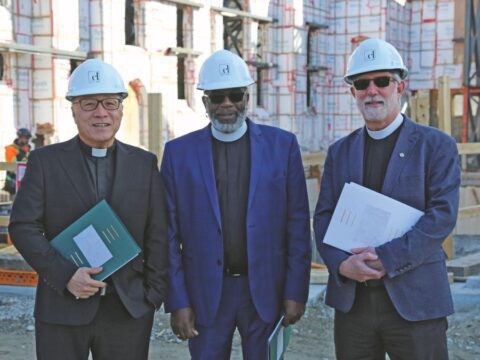This is a letter to the United Church community. It specifically addresses those who have tried to hurt me, but ultimately is a call to a church that wants to be progressive. All of these hurtful words directed towards me come from fellow Christians, both outside and within the United Church. It seems that some still don’t understand that assumptions are verbal weapons that have no place in the church.
To the people who’ve said I can’t be a church leader because I’m a woman: Being a woman is more valuable than you will ever be able to understand. I strongly believe that my gender is not a detriment to the church. It does not make me less capable or my words less powerful. There is something about me, whether or not it’s related to my body and my identity, that the church is going to need. I would never look at someone and question their life call because of their identity. I ask that you provide me the same courtesy.
You may unsubscribe from any of our newsletters at any time.
You complain about the absence of youth and young adults in the church, and yet, you think the step I’ve taken is too big or just unacceptable?
To the people who’ve said I can’t be a church leader because I’m too young, or to those who have asked if I am “keeping up” with the older folks in my classes OK: I really don’t understand. You complain about the absence of youth and young adults in the church, and yet, you think the step I’ve taken is too big or just unacceptable? I’m proud that I’m a 20 year old who is already partway through her theological education. I have a fresh perspective, and I show myself every day that I am just as capable as those who are older.
I’m not trying to say that life experience holds no merit, but I can’t get that experience unless you first encourage me in opportunities to learn and grow. These opportunities for growth are especially plentiful in ministry education. If you truly want young people to be more present in the church, having open arms and open doors towards those who feel a call is an important first step.
To the people who’ve said that people will only listen to me when I’m a minister because I’m pretty: You may think you are complimenting me in some twisted way, but you are discrediting so much of what I am. I don’t think I’m beautiful just because of what people can see on the outside. I think I’m beautiful because I have a great mind, I have a kind soul, and I have the motivation to do something great with my life. People will listen to me because I have something important to say. People will listen to me because through my words I will bring people closer to God, and call them to discover who God is for them.
I am a woman, I am young and I’m also so much more than that. I’m proud of everything that I am, and I’m also proud that I’ve decided to follow God’s call. But some think my call lies elsewhere.
To the people who have said that I’m wasting my intelligence and my good grades: You said I could do anything I wanted. And here I am, pursuing the one thing I want most in the world, and yet that isn’t enough for you. You said I could have been a doctor or a scientist, but I didn’t want and still don’t want to be those things. God gave me intelligence, and I don’t plan on throwing it away. I know that intelligence is useful in fields other than science or mathematics. I plan to use mine to inspire the people to whom I preach to grow in faith through knowledge. I want people to learn something when they come to worship. If this use of my intelligence isn’t enough for you, then I’m afraid you’ll never be satisfied.
I want people to learn something when they come to worship. If this use of my intelligence isn’t enough for you, then I’m afraid you’ll never be satisfied.
To the people who said I could have done something that would have “really helped people”:A congregation should be a community in which all members help one another. This help comes through emotional support, sharing knowledge and experiences, outreach and an overarching feeling of love. If you are unable to see this in your current community of faith, I would assess whether or not it is the right community for you. Finally, I am sorry that you have not yet experienced the profound help that ministry personnel can and do provide.
Assumptions about how age, gender, and other characteristics affect one’s ability to serve the United Church are still present and heard often. This dampens the affirming spirit that helps define many congregations. These assumptions could also turn young individuals with a call away from a church that is often vocal about wanting a stronger youth presence. There is a lot of work to be done, but I choose to be hopeful rather than discouraged.














